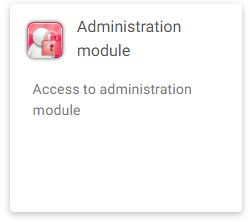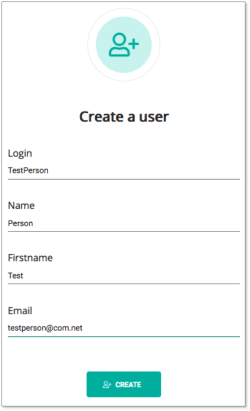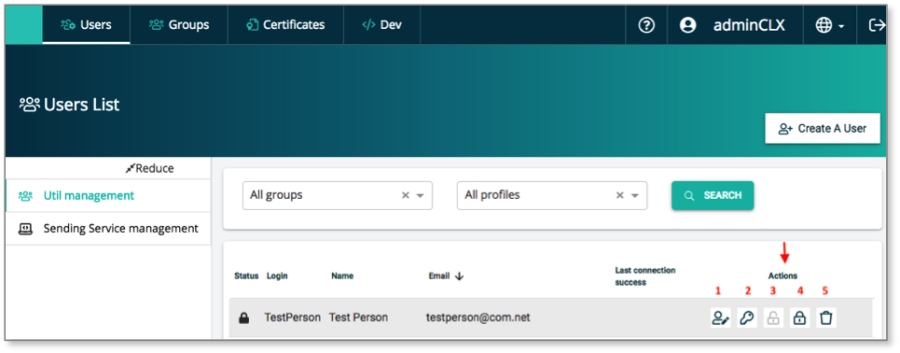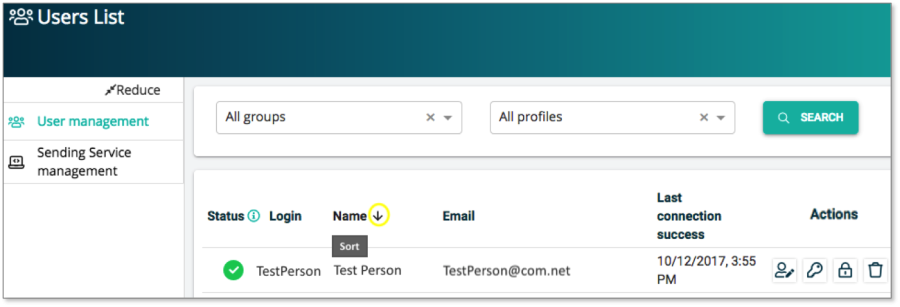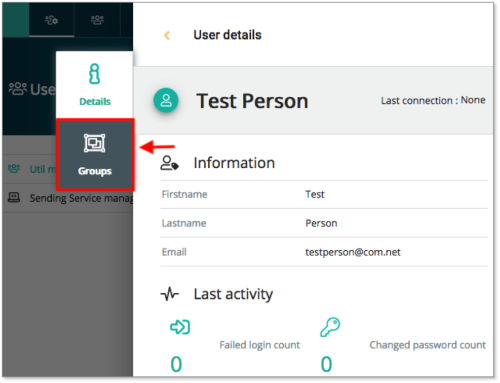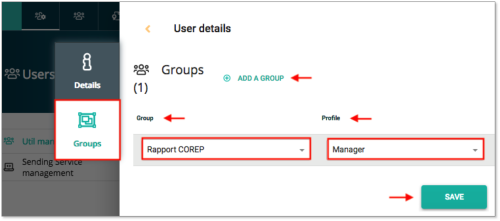Difference between revisions of "MIFID2"
| Line 131: | Line 131: | ||
= Sending Service management = | = Sending Service (SD) management = | ||
Press the '''Sending Service Management''' button. The '''Sending Service List''' opens. | Press the '''Sending Service Management''' button. The '''Sending Service List''' opens. | ||
| Line 137: | Line 137: | ||
Explanations: | Explanations: | ||
1. Status: the green check mark indicates the Sending is active | 1. Status: the green check mark indicates that the Sending Service (SD) is active | ||
2. Login: it is the login of the | 2. Login: it is the login of the SD user | ||
3. Last connection: date of the last connection of the Sending Service | 3. Last connection: date of the last connection of the SD to e-file | ||
4. Version: when you move the mouse over the i (=information), the name of the latest SD version available on e-file pops up | |||
5. SD version number of your current SD. If you want to update your SD press the download button [[File:DownloadButton.png|70px]] and download the latest SD version available with our | |||
[[Sending_Service#Installation_with_Sending_Service_Installer|'''Sending Service installer''' (assistantSD.jnlp) | |||
[[Category: FAQ e-file]] | [[Category: FAQ e-file]] | ||
Revision as of 10:07, 7 October 2018
Create a new e-file user
Step 1:
Connect to e-file.lu with your e-file administrator login (adminXXX) and click the Administration module icon.
Step 2:
Click the Users button
Step 3:
The Users list screen opens. Click the Create a user button
Step 4:
The Create a user window pops up. Complete the form as shown in the figure below and click the Create button.
Step : 5
Go back to the Users list screen. Move the mouse over the user you just created. Five icons will appear allowing to perform the following actions:
Action 1: Edit user settings
Action 2: Force password change. If you press this icon, an email is sent to the user with a web-link to reset his password.
Action 3: The user is locked. Please be informed, that a new user will automatically be unlocked when he logs in for the first time.
Action 4: Lock the user.
Action 5: Delete the user.
Sort functions in the Users List
The Login, Name, Email and Last connection columns can be sorted (A to Z or smallest number to largest).
Example:
If you want to sort the Name column from A to Z or Z to A, click directly on Name on the top of the column. The direction of the arrow shows whether the sort is ascending or descending.
Filter functions in the Users List
Example:
If you want to display in the Users List only the users to whom the Group FATCA and the profile Manager have been assigned, you have to select the filter criteria as shown in the figure below and press the SEARCH button.
Assign groups and profiles to users
Step : 1
Open the Users list screen (see screen above) and click the Edit icon of the user to whom you want assign groups and a specific profile.
Step : 2
The User details screen opens. Click the Groups icon.
Step : 3
The User details / Groups screen opens.
Select the groups and profile you want to assign and click the ADD A GROUP button. Once you have added the groups and selected the profile, click the Save button.
Please be informed that you can find detailed information on all groups on our Wikipage Product Coverage; column e-file user account: "groupe".
Example:
If a user has to send COREP reportings to the CSSF, the e-file administrator must assign the group Rapport COREP and the profile Manager to the user.
Sending Service (SD) management
Press the Sending Service Management button. The Sending Service List opens.
Explanations:
1. Status: the green check mark indicates that the Sending Service (SD) is active
2. Login: it is the login of the SD user
3. Last connection: date of the last connection of the SD to e-file
4. Version: when you move the mouse over the i (=information), the name of the latest SD version available on e-file pops up
5. SD version number of your current SD. If you want to update your SD press the download button ![]() and download the latest SD version available with our
and download the latest SD version available with our
[[Sending_Service#Installation_with_Sending_Service_Installer|Sending Service installer (assistantSD.jnlp)
